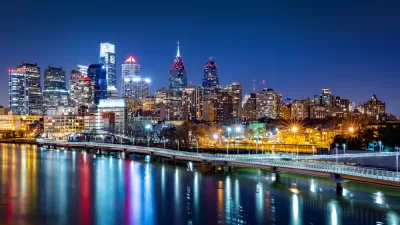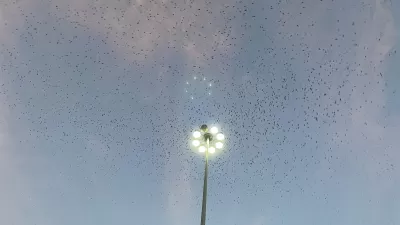More than 15 years of advocacy, and one particularly galvanizing bird kill event, have created the momentum necessary for widespread adoption of the Lights Out Philly initiative.

Nate Berg reports that the city of Philadelphia is finally taking collective action to prevent bird deaths from collisions with buildings.
"Beginning April 1, and running for the duration of both the spring and autumn bird migration periods, buildings across Philadelphia will be voluntarily turning off their lights at night," writes Berg.
The voluntary effort is the result of advocacy work by Audubon Mid-Atlantic dating back to 2006. But the final straw was a particularly devastating episode in October 2020, when a "rare convergence of the semiannual migration period and bad weather," along with lights left on buildings, combined to kill more than 1,000 birds in one night.
Bird deaths resulting from collisions with buildings are nothing new. Seemingly clear flight paths seen through the windows of buildings, reflections of trees and other potential habitats, and the lure of bright and confusing lights during nighttime migration all contribute to a shocking number of bird-building crashes. Researchers estimate that collisions with buildings cause up to one billion bird deaths annually in the United States, making a very clear argument for why buildings and cities need to be designed with birds in mind.
Berg describes more about the voluntary initiative called Lights Out Philly in the source article linked below.
FULL STORY: Philadelphia is about to go completely dark at night. Here’s why

Planetizen Federal Action Tracker
A weekly monitor of how Trump’s orders and actions are impacting planners and planning in America.

Congressman Proposes Bill to Rename DC Metro “Trump Train”
The Make Autorail Great Again Act would withhold federal funding to the system until the Washington Metropolitan Area Transit Authority (WMATA), rebrands as the Washington Metropolitan Authority for Greater Access (WMAGA).

DARTSpace Platform Streamlines Dallas TOD Application Process
The Dallas transit agency hopes a shorter permitting timeline will boost transit-oriented development around rail stations.

Renters Now Outnumber Homeowners in Over 200 US Suburbs
High housing costs in city centers and the new-found flexibility offered by remote work are pushing more renters to suburban areas.

The Tiny, Adorable $7,000 Car Turning Japan Onto EVs
The single seat Mibot charges from a regular plug as quickly as an iPad, and is about half the price of an average EV.

Supreme Court Ruling in Pipeline Case Guts Federal Environmental Law
The decision limits the scope of a federal law that mandates extensive environmental impact reviews of energy, infrastructure, and transportation projects.
Urban Design for Planners 1: Software Tools
This six-course series explores essential urban design concepts using open source software and equips planners with the tools they need to participate fully in the urban design process.
Planning for Universal Design
Learn the tools for implementing Universal Design in planning regulations.
Municipality of Princeton
Roanoke Valley-Alleghany Regional Commission
City of Mt Shasta
City of Camden Redevelopment Agency
City of Astoria
Transportation Research & Education Center (TREC) at Portland State University
US High Speed Rail Association
City of Camden Redevelopment Agency
Municipality of Princeton (NJ)





























